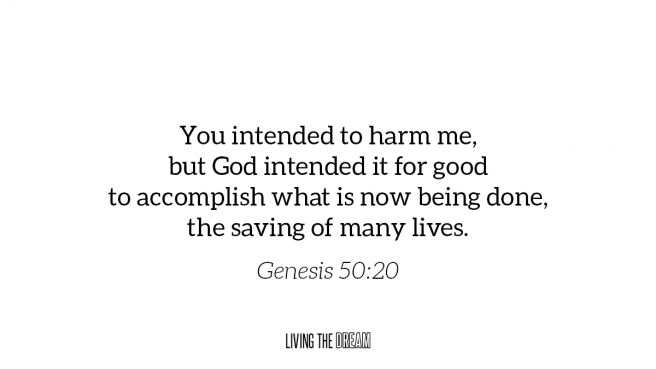Opening Prayer: “Glory to the Father, and to the Son, and to the Holy Spirit, as it was in the beginning, is now, and will be forever. Amen.”
Daily Scripture Reading:
- Genesis 41:50-52
- Genesis 50:20
- Psalms 135:6
- Proverbs 16:4
- Romans 8:28
The Sovereignty of God. It is a theology that entire denominations have been built and broken on. Questions like what does God cause and what does God allow are more than just semantics. Where does God’s control end and free will begin? How do His plans interact with the sins of man and the will of Satan to steal, kill, and destroy? People a lot smarter than me have been arguing these points for centuries and we will not perfectly answer these questions today.
What is not in question is God’s hand in every twist and turn of Joseph’s story. He was with him in the pit, in Potiphar’s house, in Prison, and in the Palace. He used the good, bad, and ugly parts of Joseph’s journey to bring Him to Genesis 50:20 where Joseph declares to his brothers, “You intended to harm me, but God intended it for good to accomplish what is now being done, the saving of many lives.”
Joseph’s brothers intended death, but God intended life. Joseph’s brothers thought it was the end of his dreams, but knew it was just the beginning. We may never know the exact line of what God causes and what God allows in a fallen, broken world, but we can be confident that He can USE every bit of our story for His purposes as well.
Have you ever used fertilizer or compost in your yard, garden, or flower beds? There are many store brand fertilizers full of chemicals but when we get back to basics we find that it is usually made of manure. The actual definition of manure is “excrement, especially of animals, or other refuse used as fertilizer.” Similarly, compost is “a mixture of various decaying organic substances used for fertilizing soil.” It’s the watermelon rinds, the old newspapers, the grass clippings, the used coffee grinds and the egg shells. It’s the unused, inedible, and rotting. Both fertilizer and compost are smelly, dirty, and gross. But every good gardener, farmer, or green thumb knows it is golden. It adds life and nutrients to the soil and to the plants that will eventually grow in it. Something rotten becomes something beautiful. Something dead bring life.
God can redeem all things. With Him, nothing is wasted. He can use our hurts, our shame, the things that were done to us and even our own mistakes. On their own, these things can stink up a life and rot out a soul. But when we remain faithful and bring them to God we can say like Joseph, “God has made me fruitful in the land of my suffering.” He can use the parts of our story, our past, the detours on our journey for our good and His glory.
Today’s Big Questions: When you look at your own journey towards God’s purposes and dreams for your life, can you identify places where someone meant to harm you, but God used it for good? Have you turned over the rotten parts of your story to Him for Him to redeem?
Prayer Response: Today ask the Holy Spirit to reveal those detours He has used or desires to use you in your life. Sit still in His presence long enough to be encouraged that “no weapon formed against you shall prevail (Isaiah 54:17)” and His sovereignty means that nothing is wasted or unredeemable.
Optional Action Step: Tell someone about the ways you have seen God use what was meant for evil and death in your story for good and life. Encourage them to share their own “fertilizer to fruitfulness” story. Maybe even start collecting kitchen scraps in an old coffee can to use in your flower beds as a reminder that nothing is wasted with God.
Closing Prayer: “Now to Him who is able to do immeasurable more than all we ask or imagine, according to His power that is at work within us, to Him be glory in the church and in Christ Jesus throughout all generations, for ever and ever! Amen.”
